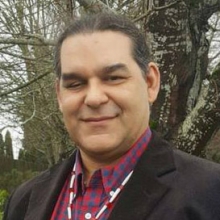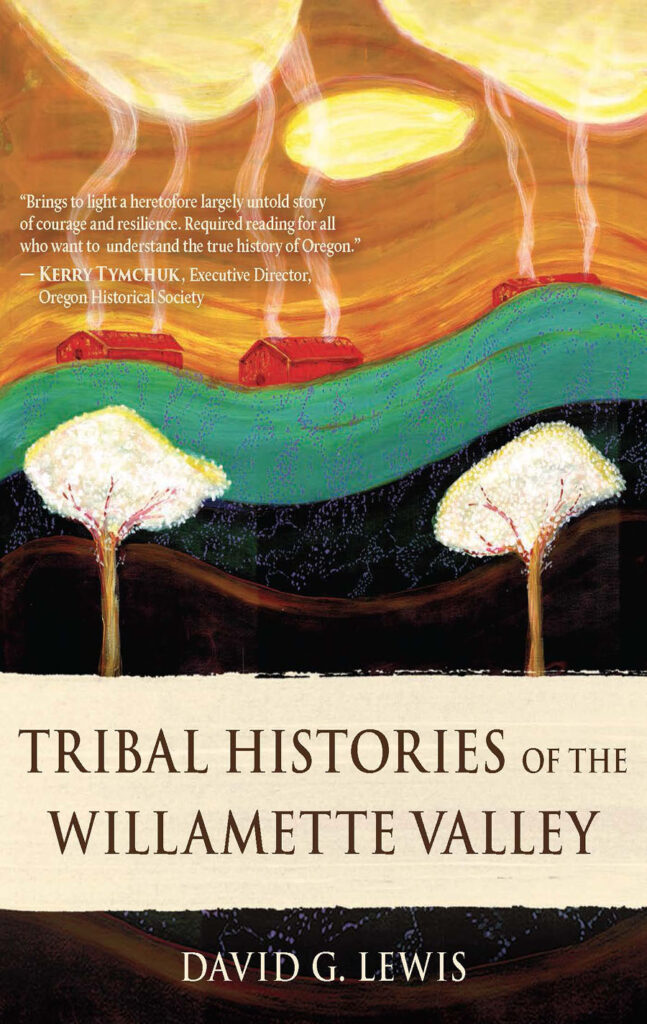 David G. Lewis is a specialist in the history of Kalapuyans and other Western Oregon tribes which he has been studying for more than two decades. A member of the Confederated Tribes of Grand Ronde, a descendant of the Santiam, Takelma and Chinook peoples, he has an extensive record of publications and collaborative projects with regional scholars, tribes, local governments, and communities. Lewis has a PhD in anthropology from the University of Oregon and is an Assistant Professor of anthropology and Indigenous studies at Oregon State University. He is a former Cultural Department Manager of the Grande Ronde Tribe.
David G. Lewis is a specialist in the history of Kalapuyans and other Western Oregon tribes which he has been studying for more than two decades. A member of the Confederated Tribes of Grand Ronde, a descendant of the Santiam, Takelma and Chinook peoples, he has an extensive record of publications and collaborative projects with regional scholars, tribes, local governments, and communities. Lewis has a PhD in anthropology from the University of Oregon and is an Assistant Professor of anthropology and Indigenous studies at Oregon State University. He is a former Cultural Department Manager of the Grande Ronde Tribe.
He currently resides in Chemeketa, now Salem, Oregon, with his wife, Donna, and two sons, Saghaley and Inatye.
Ed Battistella: Congratulations on your book Tribal Histories of the Willamette Valley, which was really eye-opening for me. You documented a lot of history that we often don’t hear about, like the slave trade in Oregon, the passbook system in the late 1800s and the path to US citizenship. What was the research process like—and what was most surprising to you?
David G. Lewis: This took some time. I was initially only studying Grand Ronde tribal histories then some 12 years ago branched out to all western Oregon and so much opened up for me. The histories of all the tribes and reservations are linked in many ways. I found that I could not study only one tribe, because then the history did not include the interrelationships we all have in treaties, US Indian policies, and events of the time.
EB: You describe what you call “an alternative history of Native peoples in the Willamette Valley,” what do you mean by that?
DGL: Well, I think we all are aware that most histories have been and are written without Native people involved in them, few native people are consulted and in early histories our people are completely discounted. So, this represents the other “alternative perspective” those of Native people not seen in most histories. I hope this becomes mainstream as people realize how little of US history has been told. I tried to get to Native perspectives as much as possible as they lost land, people, rights, and struggled through generations of mistreatment. This all stands counter to “normal” US histories that have aggrandized the actions and intents of the settlers.
EB: How have attempts to engage with and present Native history evolved?
DGL: I think changes come when I make new discoveries or gain a new perspective. Two years ago I found a bunch of census counts most scholars had never used or perhaps seen before. These became available when UO and OHS Library put the Palmer papers online. This find opened up the events of 1855 and 1856 and showed me the exact daily movement of the tribes from living in their traditional lands to the reservations at Grand Ronde. From this my ideas changed, and this has begun to change the written history of the tribes. Then about 3 years ago I found 2 new pages belonging to the Willamette Valley Treaty- never mentioned before in scholarship. This brought 5 tribes to the treaty in microfilm records, and this opened the history of treaty-making a lot. Some 15 years ago I found the Grand Ronde Passbook in the Siletz collection at OHS library, and it seems that now whenever I delve into an archive, I find something new that can answer key questions in Tribal history. Just recently the National Archives made their maps and treaty files available for digital download online, I have not fully investigated this, but the maps are in color now, in high definition, and new placenames and details are emerging that can address Native history. As new resources are available, made available through technology and innovation this opens up the possibilities of research quite a bit, makes it easier with less barriers to finding the actual history. I, no longer must travel to archives to find documents, there is now a good record online, and this is dramatically altering the ways history can be researched.
EB: Who is your ideal reader? It seems to me that Tribal Histories of the Willamette Valley would be a great text for courses in Native history and in Oregon history.
DGL: Yes, exactly. I initially wanted this to be a text for high school students, but the book can easily be for college. I also wanted to not have too much academic jargon, a more narrative style with some personal perspectives in it. It is a more accessible text for a wider audience. I have heard from readers that this is appreciated.
EB: I had not heard of the Grande Ronde Guard. What was that?
 DGL: Another discovery. For about a month and a half, Joel Palmer hired about 60 men to guard the reservation from white settlers. There were lots of rumors of people in the Willamette Valley who were going to attempt genocide on the tribes, in retribution for the “Indian Wars.” Governor Curry was not a friend to the Tribes and his militias were committing genocides in Southern Oregon and Washington Territory. They were also upset Palmer had placed the tribes near the valley and I think a few settlers feared the tribes would band together and attack the valley, something which never happened. Palmer put good plans in place to hire these guards, build a fence, and protect the Natives. They were disbanded on May after it was clear the threat was not going to manifest. But Palmer did the right thing to protect the people and for this he should be honored.
DGL: Another discovery. For about a month and a half, Joel Palmer hired about 60 men to guard the reservation from white settlers. There were lots of rumors of people in the Willamette Valley who were going to attempt genocide on the tribes, in retribution for the “Indian Wars.” Governor Curry was not a friend to the Tribes and his militias were committing genocides in Southern Oregon and Washington Territory. They were also upset Palmer had placed the tribes near the valley and I think a few settlers feared the tribes would band together and attack the valley, something which never happened. Palmer put good plans in place to hire these guards, build a fence, and protect the Natives. They were disbanded on May after it was clear the threat was not going to manifest. But Palmer did the right thing to protect the people and for this he should be honored.
EB: You document some instances in which there are parallel histories of events, different accounts from different tribes or different groups of settlers. What can we learn from those parallel histories?
DGL: There has been a lot of rewriting and reconfiguring of history by historians, sometimes to fulfill their vision of an “American National History.” This has altered many histories of Native peoples significantly. Sometimes histories have been written with contemporary politics in mind. Because of these different agendas we end up with a lot of parallel histories, which do not match up. I really try to keep politics out of my history, I was not funded by any entity to write this history, this is purely my creation based on what I have found in records. No support for this came from Grand Ronde, the tribe I am enrolled in.
EB: What other scholarly projects are you working on?
DGL: For some years now, I have been working on an edited volume Kalapuyans of Western Oregon with fellow editors Tom Connelly and Henry Zenk. This volume will have essays from a number of scholars, archaeologists, linguists, historians, both tribal and non-tribal. I want to submit the manuscript to OSU press next summer. I have additional histories of the Kalapuyans in this volume which is a bit more academically focused. I also have plans for a reworking of my dissertation to tell the history of termination from the tribal perspective. I have had a hard time finding many of those perspectives but I know where many oral accounts are now.
EB: What was the process of working with Ooligan Press like? They’ve produced a very handsome book.
DGL: It was interesting, every term there were new students to work with, over the course of two years they did an excellent job at all aspects of the manuscript. It works for a non-academic text, if it were more academic, I think a more intense editorial process would be better. But the suggestions they made to have personal experiential essays, to create the cover out of Greg Robinson’s art, and to help recreate maps were all very helpful. Their timeline was helpful too, to keep me on track to complete the book.
EB: Thanks for talking with us.
DGL: Thank you for reaching out, I think this book will make waves in Tribal history and I know the histories of the tribes here will never be the same. I feel in many ways like I am giving back to the community for the tribe supporting my education, and to other tribes who worked with me on projects throughout the years. As a Native person I feel a strong responsibility to work on behalf of the Native community. And I think this book does that.

 Follow
Follow